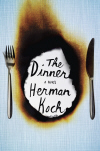The Dinner
Dutch novelist Herman Koch’s The Dinner, a bestseller in Europe, is funny, intense and discussable for its morality. Two brothers and their wives meet at a topnotch Amsterdam restaurant to talk about their fifteen-year-old sons. One brother, Serge, is a politician, a shoo-in for prime minister, and the other, the narrator Paul, was a high school history teacher. At first the novel is funny due to Paul’s acerbic comments on the restaurant’s pretensions and his brother’s obvious love of being in the spotlight. But then when we learn of the crime perpetrated by Paul’s son Michel and Serge’s son Rick, and we learn more of Paul’s background, the book grips us with its surprises.
Dutch novelist Herman Koch’s The Dinner, a bestseller in Europe, is funny, intense and discussable for its morality. Two brothers and their wives meet at a topnotch Amsterdam restaurant to talk about their fifteen-year-old sons. One brother, Serge, is a politician, a shoo-in for prime minister, and the other, the narrator Paul, was a high school history teacher. At first the novel is funny due to Paul’s acerbic comments on the restaurant’s pretensions and his brother’s obvious love of being in the spotlight. But then when we learn of the crime perpetrated by Paul’s son Michel and Serge’s son Rick, and we learn more of Paul’s background, the book grips us with its surprises.
The Dinner is divided into the various courses of the meal, from Appetizer to Dessert. They each leave a bittersweet taste, especially as we approach the unexpected end.
Many of Paul’s observations about fancy restaurants will resonate with readers:
I know someone, an old friend, who spent a few years working in “top restaurants.” Their tactic is to actually force as much wine as possible down your throat, wine they sell for seven times what the importer charges for it, and that’s why they always wait so long between bringing the appetizer and taking orders for the entrée: people will order more wine out of pure boredom, just to kill time. . . . The appetizer arrives quite quickly, because if the appetizer takes too long, people start complaining. They start to doubt their choice of restaurant, but after a while, when they’ve had too much drink between appetizer and entrée, they lose track of time. [My friend] knew of cases where the entrees had been ready for a long time but remained on the plates in the kitchen because the people at the table in question weren’t complaining. Only when there was a lull in the conversation and the customers started to look around impatiently were the plates shoved into the microwave.
We chuckle at the manager’s pinkie being too close to the food, the explanation of the origin of practically every leaf of lettuce, and the revelations about Serge—now a wine expert, but who once drank huge amounts of cola, “knocking back an entire king-size bottle at dinnertime” and producing “belches that lasted ten seconds or longer.”
We enjoy his observations, such as those about his students (“All these heads into which everything disappears”) and other truths: “Within the last minute, I had heard my own first name repeated—how often?—six times. It’s my experience that when people go on repeating your first name, they want something from you and it’s usually not something you want to give.”
And there’s the truth about getting used to the old ludicrous politician: “. . . like a stain on the wallpaper. A stain that seemed simply to belong there, and which could only surprise you by one day not being there at all.”
Paul is irresistible in his exposure of hypocrisy, but the dark cloud of Michel’s and Rick’s for-a-long-time-undefined crime looms in the background, along with Rick’s mysterious and not so innocent brother, the African adoptee Beau.
And Paul, our narrator, seems unreliable in his fierce obsession with maintaining the image of the happy family. His actions throughout his life are described as being out of line. He refuses to tell—because it’s “nobody’s business”—the name of the restaurant, or his former place of employment. But more troubling is the source of his own problems, and his son Michel’s name for him, “Dear old Dad,” becomes more and more chilling.
And while Serge is not as bad as Paul depicts him to be, he and wife Babette are equally obsessive about his political future. In other matters, they are naïve, for instance in their view of the French attitude towards them and their fellow Dutch homeowners in France:
[Serge] seemed at ease among the French, each and every one of them just regular people, after all. Regular people were his specialty in Holland, so why not here as well? [He did not see] the nods and winks that spoke volumes concerning the despicable boorishness of these Dutch people.
However, their naïveté towards their adopted son Beau has more serious consequences.
The only problem with this novel was its bits of implausibility. Would a family discuss such private matters in a public restaurant where they could be overheard? And would Paul’s outburst at the restaurant owner be overlooked and ignored as it is? And the lack of identity of Paul’s ailment causes us to question its reality—though then we can question his morality. Perhaps most surprising of all, we care about these unpleasant people. In fact, we are riveted until the very end.





